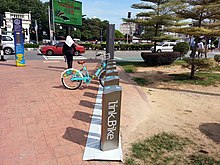
Butterworth is the city centre of Seberang Perai in the Malaysian state of Penang. It lies about 3 km (1.9 mi) east of George Town, the capital city of Penang, across the Penang Strait. As of 2020, Butterworth had a total population of 80,378 residents.

Transportation Alternatives is a non-profit organization in New York City which works to change New York City's transportation priorities to encourage and increase non-polluting, quiet, city-friendly travel and decrease automobile use. TransAlt seeks a transportation system based on a "Green Transportation Hierarchy" giving preference to modes of travel based on their relative benefits and costs to society. To achieve these goals, T.A. works in five areas: Cycling, Walking and Traffic Calming, Car-Free Parks, Safe Streets and Sustainable Transportation. Promotional activities include large group bicycle rides.

Bukit Mertajam is a suburb of Seberang Perai in the Malaysian state of Penang. It also serves as the seat of the Central Seberang Perai District. As of 2010, Bukit Mertajam (core) contains a total of 13,097 residents.
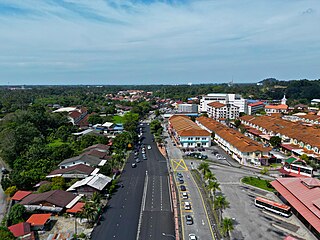
Balik Pulau is a suburb of George Town within the Malaysian state of Penang. Located 12.7 km (7.9 mi) southwest of the city centre, it lies near the southwestern corner of Penang Island and is also the administrative seat of the Southwest Penang Island District.

Bayan Lepas is a suburb of George Town in the Malaysian state of Penang. Located near the southeastern tip of Penang Island, 15 km (9.3 mi) south of the city centre, it is home to the Penang International Airport, the third busiest airport in Malaysia, as well as one of the oldest free industrial zones in the country.

Batu Kawan is an island and suburb of Seberang Perai in the Malaysian state of Penang. It is geographically separated from the rest of Seberang Perai by the Jawi and Tengah rivers. As of 2010, Batu Kawan contained a population of 5,537.

Tanjong Tokong is a suburb of George Town in the Malaysian state of Penang. It is located at the northeastern coast of Penang Island, 4 km (2.5 mi) northwest of the city centre. Over the recent decades, the former fishing village has been transformed into an upper class residential suburb of the city, with high-rises such as Straits Quay lining the coast.

Tanjong Bungah is a suburb of George Town in the Malaysian state of Penang. It is located along the northern coast of Penang Island between Batu Ferringhi and Tanjong Tokong, about 6.5 km (4.0 mi) northwest of the city centre. Tanjong Bungah is well known as a beach destination, with several hotels and resorts lining the beaches within the area. Decades of urbanisation has also led to the mushrooming of residential high-rises at the suburb.

Gelugor is a suburb of George Town in the Malaysian state of Penang. Named after a plant species, Gelugor lies along the eastern seaboard of Penang Island, between Jelutong and Sungai Dua, and nearly 5 km (3.1 mi) south of the city centre.
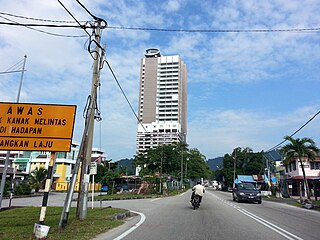
Teluk Kumbar is a suburb of George Town within the Malaysian state of Penang. It is located about 17.8 km (11.1 mi) south of the city centre, at the southern coast of Penang Island between Bayan Lepas to the east and Gertak Sanggul to the west.
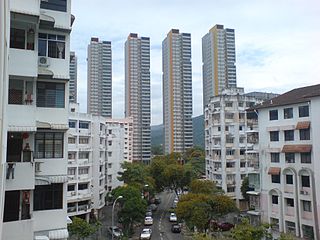
Batu Lanchang is a residential neighbourhood within the downtown core of George Town in the Malaysian state of Penang. It is sandwiched between Farlim to the west and Jelutong to the east.

The State of Penang in Malaysia, home to the country's third largest city as well as part of Malaysia's second most populous conurbation, has a relatively well-developed transport infrastructure. The city-state is well-connected by land, air and sea; the Penang International Airport is one of Malaysia's busiest, while the Port of Penang is the main harbour and transshipment hub within northern Malaysia. The North–South Expressway, the main highway along western Peninsular Malaysia, runs through Penang, while the two geographically separate halves of the state are now linked by two bridges and a ferry service.
The Government of Penang refers to the government authority of the Malaysian state of Penang. The state government adheres to and is created by both the Constitution of Malaysia, the supreme law of Malaysia, and the Constitution of the State of Penang, the supreme law in Penang. The government of Penang is based in the state's capital city of George Town.

Seri Tanjong Pinang is a residential neighbourhood within the city of George Town in the Malaysian state of Penang. The neighbourhood, located within the Tanjong Tokong suburb, lies 4.5 km (2.8 mi) northwest of the city centre and was created on land reclaimed in the 1990s.

The Greater Penang Conurbation, also known as the George Town Conurbation, is the built-up urban or metropolitan area within and around the Malaysian state of Penang. Encompassing all of Penang, and parts of the neighbouring states of Kedah and Perak, the conurbation was home to over 2.84 million people as of 2020, the second largest in the country after the Klang Valley.

LinkBike is a public bicycle sharing system serving the city of George Town in Penang, Malaysia. Launched in 2016, it is the first such system in Malaysia. Currently, there are 250 LinkBike bicycles and 25 stations throughout the city, including its UNESCO World Heritage Site, as well as suburban places like Queensbay Mall.

Design Village is an outlet mall in Batu Kawan, Penang, Malaysia. Opened in 2016, it is Malaysia's biggest outlet mall, spanning a built-up area of 37,161 m2 (400,000 sq ft). Design Village is reportedly built on a 24-acre tropical garden. At the time of its opening in November 2016, the mall was nearly 70% filled with tenants. Among the tenants are Gap, Timberland, Pierre Cardin, Padini, Adidas, Body Glove, Levi's, Guess, Samsonite, Esprit and Cotton On. There are eateries within the mall such as Coffee Bean, Starbucks, Baskin-Robbins and Wendy's. A handful of health care stores also complement the wide range of international brands, including Watsons and 7-Eleven.
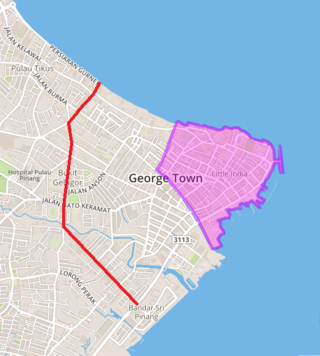
George Town Inner Ring Road is an urban ring road within the city of George Town in Penang, Malaysia. It comprises the eastern end of Gurney Drive, Jalan Pangkor, Jalan Perak and Jalan Sungai Pinang, forming a loop within the city centre.

The City Park, also colloquially known as the Youth Park, is an urban park within the city of George Town in the Malaysian state of Penang. Located near the Penang Botanic Gardens, the City Park was opened in 1972 as a recreational area and a green lung for the city's residents.

The Penang Hot Air Balloon Fiesta is an annual hot air balloon festival held within the city of George Town in Penang, Malaysia. The festival, organised by AKA Balloon Sdn Bhd, a Malaysian private limited firm, takes place every February at the city's Polo Ground.
